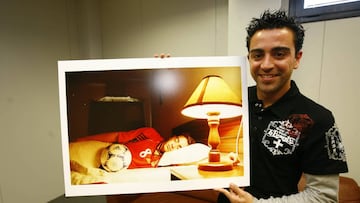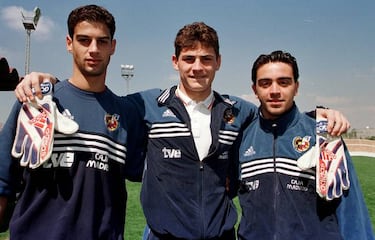Xavi and Spain's Under-20s are crowned world champions (1999)

During those years, Spain's national team, at every level, was marooned in one of the deepest depressions in living memory. In the public's collective consciousness, the idea of 'always reaching the quarter finals, then being eliminated' had started to become an unhealthy obsession. There had been some notable campaigns in the lower categories, but at the time, all of the attention was centred on Real Madrid and Barça. The national team, or at least the senior side, seemed to be going backwards nit forwards. So when that World Youth Championship got underway in Nigeria, it was hardly surprising that nobody gave it much attention, is any at all. Even the players themselves, who looked uncomfortable out there (unfamiliar or poor food, and the digs were even worse), were probably hoping it would be over as soon as possible. And besides, they'd only reach the quarter finals as Spain always did, then they'd be on their way back home. The tournament started in Calabar, a city without proper roads or pavements and with humidity at unbearable levels. After that, Spain travelled to Port Harcourt where, after a seemingly endless journey through dense jungle, they arrived at the team hotel to be welcomed by gun shots…
Related stories
But there were some very talented young players in that group - three in particular: Xavi, Casillas and Carlos Marchena, who later in their careers would win the Euros. Casillas didn't play all of the games, he alternated with Dani Aranzubia, but he played a crucial role on the key days. Team coach, Iñaki Sáez, and his fitness trainer/assistant, Carlos Lorenzana had done a superb job of mentally prepraing the young players. He gave them something extra to think about - the Bosman ruling had just come into force, opening Europe's frontiers to players from other countries. "From now there will be even more competition for a place at teams in Spain; but at the same time, there will be more opportunities outside of Spain. This is your chance to showcase what you've got, get yourself seen, because there are scouts from all parts of the continent here watching and taking notes…". That little pep talk - together with a win over a Brazil side featuring Ronaldinho boosted Spain's Under-20 players morale no end, and the team went from strength to strength in the following games. They ended as champions of a group which included Brazil, Zambia and Honduras. In the Round of 16 they faced the United States. They reached the dreaded quarter finals, where they would meet Ghana, who they suspected, for their physical aspect, had fielded players who were over 20. It was the most difficult game and ended in a draw even after extra-time. So on it was to the penalty shoot-out. It was precisely then that Iker Casillas, a lad who had been highly spoken of by those in the know, really came into his own. Spain had got through a quarter final... at last. A semi-final meeting with Mali was won easily with goals from Xavi and two from Varela and Spain found themselves in the final with Japan. The final, relative to the previous games, was a cakewalk; Spain won 4-0 in the capital, Lagos, where conditions were much better and they really did feel like kings of the world.

Moving the strings of the U-20 side was Xavi. On the eve of the final he let a photographer take a photograph of him, tucked up in bed with his Spain jersey on, lit just by the bedside lamp, and a football held close to his chest. "Dreaming of football", the article, which was published the following day was titled. Even today it's an image which has an impact. He was named player of the tournament. Pablo Couñago, with five goals, ended as the top scorer. Many of those in that team went on to settle into life in the top flight: Casillas, Aranzubia, Marchena, Xavi, Orbaiz, Colsa, Varela, Rubio, Gabri, Barkero, Yeste, Aganzo, Pablo Couñago… others however, like Coira, Jusué, Bermudo, Álex and Rubén weren't so lucky and remained in the lower categories, some as a result of ongoing injuries. But all of them filled the public with pride and opened a fierce debate as to whether the borders should be opened to players from other countries when the national product was so good. It wasn't unusuakl to hear arguments along the lines of: "These players will have their future places at Spanish clubs taken by players from nations which they have beaten". The anti-Bosman movement soon ran out of steam, Spain's Under-20s had gained respect, and since then, and in spite of the Bosman Ruling, there has been a greater presence of home-grown players in our league - one in which at one time, Depor fielded a side comprising 11 foreign players...
